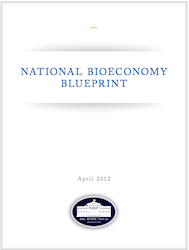 The National Bioeconomy Blueprint was recently released by the Obama Administration. The report outlines the steps that agencies need to take to drive the bioeconomy highway. The Administration recognized the growing sector has a priority due to its potential for growth and job creation. The bioeconomy will also help drive new sources of bioenergy, improve the agricultural industry, change the face of manufacturing and address key environmental issues, among other benefits.
The National Bioeconomy Blueprint was recently released by the Obama Administration. The report outlines the steps that agencies need to take to drive the bioeconomy highway. The Administration recognized the growing sector has a priority due to its potential for growth and job creation. The bioeconomy will also help drive new sources of bioenergy, improve the agricultural industry, change the face of manufacturing and address key environmental issues, among other benefits.
America’s economy is slowing transforming to a biobased economy. “Home-grown” bioproducts already developed include food, feed and fiber as well as chemical substitutes for petroleum-based products; yet the industry has barely emerged. Research is critical to the future of the industry, but it is also important, according to the report, to equip the workforce with the education, training and skills they need to have thriving careers in the sector.
Another step that needs to be taken is to reduce the troublesome regulatory barriers in order to accelerate the advancement of bioinventions and bring them to market. There are concerns, both health and ethical, that are a result of work being done with biological systems.
The Bioeconomy Blueprint outlines “five strategic imperatives” for a bioeconomy with the potential to generate new markets and economic growth:
- Support R&D investments that will provide the foundation for the future bioeconomy.
- Facilitate the transition of bioinventions from research lab to market, including an increased focus on translational and regulatory sciences.
- Develop and reform regulations to reduce barriers, increase the speed and predictability of regulatory processes, and reduce costs while protecting human and environmental health.
- Update training programs and align academic institution incentives with student training for national workforce needs.
- Identify and support opportunities for the development of public-private partnerships and precompetitive collaborations—where competitors pool resources, knowledge, and expertise to learn from successes and failures.
In conclusion, the Blueprint calls upon Federal agencies to accelerate their support of the bioeconomy sector for the benefit of the country.

